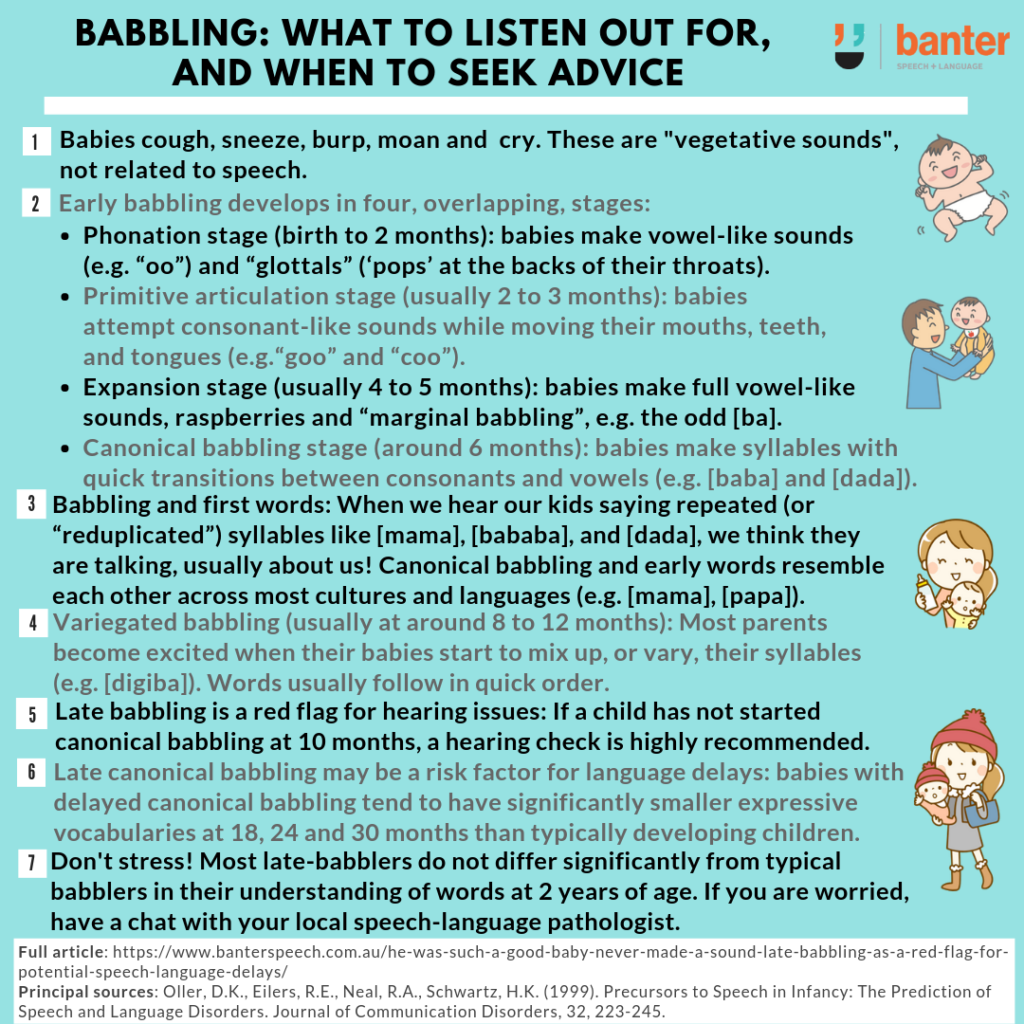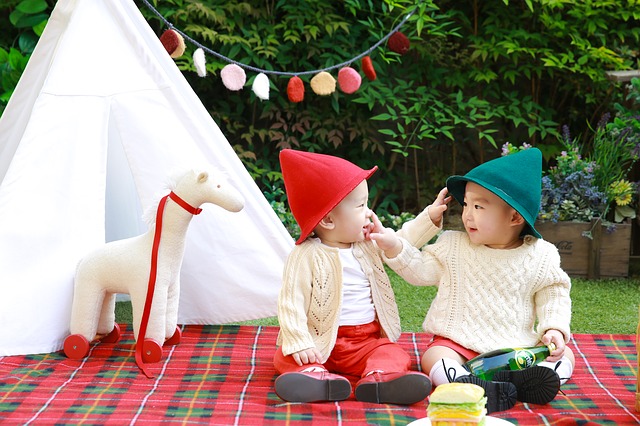Mid-last century, researchers thought that babbling was unrelated to speech (e.g. Carroll, 1960). They were wrong.
Not every sound is babbling
As almost every parent or carer can attest, babies are noisy from birth! Even in their first two months, most babies cough, sneeze, burp, moan and – of course – cry. Researchers call these sounds “vegetative” and “fixed vocal signals”. Lots of species, apart from humans, make these sounds. We don’t think they are related to speech.
‘Typical’ babbling development
Babbling develops in four, overlapping, stages:
- the phonation stage (birth to 2 months), where babies use their voices to make vowel-like sounds (e.g. “oo”) and “glottals” (‘pops’ at the backs of their throats);
- the “primitive articulation stage” (usually 2 to 3 months), where babies use their voices to make sounds while also moving their “articulators” (mouth, teeth, tongue, etc) to make consonant-like sounds (e.g.”goo” and “coo”);
- the expansion stage (usually 4 to 5 months), where babies start making full vowel-like sounds, raspberries and “marginal babbling” – consonant-vowel-like combinations (e.g. [ba]); and
- the canonical babbling stage (on average, around 6 months), where babies make well-formed syllables, and make quick transitions between consonant and vowel sounds rapidly, like in speech (e.g. [baba] and [dada]).
Babbling and first words
When most people talk about babbling, they mean canonical babbling. When we hear our kids saying repeated (or “reduplicated”) syllables like [mama], [bababa], and [dada] we think they are almost talking.
Most parents are very keen to interpret their child’s babbling as words and to encourage them with praise. It’s no accident, then, that canonical babbling and the syllables of early words resemble each other across most cultures and languages (e.g. [mama], [papa]). Parents and other carers become even more excited when their babies start to mix up their syllables (e.g. [digiba]), which is called “variegated babbling” (usually 8 to 12 months).
Late babbling as a red flag for potential speech-language delay
Like sitting up and crawling, canonical babbling has a relatively narrow range for onset for typically-developing babies. On average, it starts at six months of age. Typically developing babies rarely begin canonical babbling after 10 months, even if they are otherwise at risk for delays (e.g. babies with premature birth or very low socioeconomic status). For example, children who are profoundly deaf show delays with canonical babbling, which almost always occurs after 10 months.
In the late 1990s, the undisputed king of babbling – Professor D. Kimbrough Oller and colleagues published an important study of 3,400 babies (reference below). They concluded that infants with delayed canonical babbling (i.e. after 10 months) had significantly smaller expressive/production vocabularies at 18, 24 and 30 months than typically developing children. However, the late-babblers did not differ significantly from the typical babblers in their understanding of words at 2 years of age.

Clinical bottom line
The late onset of canonical babbling may be a predictor of speech-language delays. But, it’s just one indicator of a possible issue. If your child is not babbling regularly by 10 months of age, we recommend you consult with a speech-language pathologist who can assess, monitor and/or help with your child’s speech-language development (as appropriate). But, as with most red flags for speech and language delays, you shouldn’t panic.
Related articles:
- How do babies and toddlers choose their own words?
- “My toddler doesn’t speak at all!” Don’t panic – get informed
- Does my child have a language disorder? 6 questions speech pathologists should ask before assessment
- I want to help my late talker to speak, but I’m stuck at home. What can I do?
- Late talkers: how I choose which words to work on first
- Why I tell parents to point at things to help late talkers to speak
- Are language development and motor development related?
- 6 principles we follow when assessing toddlers for language delays and disorders
- Helping toddlers with their first words – mix it up and make them useful
- Late talkers: kick-start language with these verbs
Source: Oller, D.K., Eilers, R.E., Neal, R.A., Schwartz, H.K. (1999). Precursors to Speech in Infancy: The Prediction of Speech and Language Disorders. Journal of Communication Disorders, 32, 223-245.
Image: http://bit.ly/1eUudN7

Hi there, I’m David Kinnane.
Principal Speech Pathologist, Banter Speech & Language
Our talented team of certified practising speech pathologists provide unhurried, personalised and evidence-based speech pathology care to children and adults in the Inner West of Sydney and beyond, both in our clinic and via telehealth.


Leave a Reply